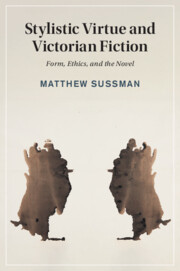Book contents
- Stylistic Virtue and Victorian Fiction
- Cambridge Studies In Nineteenth-Century Literature And Culture
- Stylistic Virtue and Victorian Fiction
- Copyright page
- Contents
- Illustrations
- Acknowledgments
- Introduction What Is Stylistic Virtue?
- Chapter 1 Stylistic Virtue and the Rise of Literary Formalism
- Chapter 2 Stylistic Virtue between Moralism and Aestheticism
- Chapter 3 Virtue Theory and the Nature of the Aesthetic
- Chapter 4 Thackeray’s Grace
- Chapter 5 Trollope’s Ease and Lucidity
- Chapter 6 Meredith’s Fervidness
- Afterword Stylistic Virtue and Literary Value
- Notes
- Bibliography
- Index
- Cambridge Studies In Nineteenth-Century Literature And Culture
Chapter 2 - Stylistic Virtue between Moralism and Aestheticism
Published online by Cambridge University Press: 11 June 2021
- Stylistic Virtue and Victorian Fiction
- Cambridge Studies In Nineteenth-Century Literature And Culture
- Stylistic Virtue and Victorian Fiction
- Copyright page
- Contents
- Illustrations
- Acknowledgments
- Introduction What Is Stylistic Virtue?
- Chapter 1 Stylistic Virtue and the Rise of Literary Formalism
- Chapter 2 Stylistic Virtue between Moralism and Aestheticism
- Chapter 3 Virtue Theory and the Nature of the Aesthetic
- Chapter 4 Thackeray’s Grace
- Chapter 5 Trollope’s Ease and Lucidity
- Chapter 6 Meredith’s Fervidness
- Afterword Stylistic Virtue and Literary Value
- Notes
- Bibliography
- Index
- Cambridge Studies In Nineteenth-Century Literature And Culture
Summary
On the surface, the ethical vocabulary of stylistic virtue reflects the fact that moral and stylistic virtues overlap. A “manly” style may connote masculine strength, just as an “honest” author may promise fidelity in representation. However, the “aesthetic” critics of the mid- to late-nineteenth century did not disavow this seemingly moralistic lexicon. Instead, Chapter 2 shows how the doubleness of stylistic virtues made them appealing to critics who sought to provide an ethical justification for formalist methods. By tracing the theory of stylistic virtue in the four Victorian critics most influenced by Aristotle – John Ruskin, Matthew Arnold, Walter Pater, and Oscar Wilde – it reveals a process of “ethico-aesthetic drift” whereby “ethical character” was increasingly understood as an aesthetic phenomenon that had autonomous value. As literary criticism came to be seen as a creative act on a par with the production of art, it too became an ethically valuable act, investing style and its appreciation with an unprecedented level of attention and esteem.
- Type
- Chapter
- Information
- Stylistic Virtue and Victorian FictionForm, Ethics, and the Novel, pp. 47 - 71Publisher: Cambridge University PressPrint publication year: 2021

